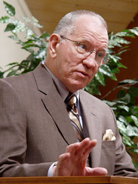An excerpt from a lecture:
In terms of how much time is given to various facets of the work of the ministry, I am presupposing the primacy of preaching among the public duties of the ministry. There are, as we shall see, both private and public duties connected with the office of an elder set apart to labor in the Word and in doctrine, but among the public ministries and responsibilities, such as counseling the distressed, giving oversight, calling on the sick, evangelism, none is so vital as that of the stated seasons of public preaching and teaching.
And this for the simple reason that, in the wisdom and purpose of God, the primary means ordained by God for the gathering out of his elect and the edification of his people is that of the preaching and teaching of the word of God. We all know Paul’s conviction of this, “God has ordained,” 1 Corinthians 1:18, “by the foolishness of the thing preached,” the kerugma, is the thing preached, it has to do with content, but not merely with content, the kerugma is the thing preached, the thing delivered as a herald in the name of the King, and God has ordained by that means to bring his saving grace to men.
And then, of course, the argument of Paul in Romans Chapter 10, “How shall they call upon him whom they have not heard, and how shall they hear without a preacher.” And, of course, the perspective in the pastoral epistles when we read them through we pick up that emphasis again and again where Paul views Timothy’s functions, which are as close to standing pastoral functions as anything we’ll find in the Scriptures, again and again, his teaching, his preaching, the subject, the content, the manner, Paul emphasizes again and again.
And then, of course, the description of overseers in Hebrews 13:7, “Remember those that have the rule over you,” and how are they identified, very specifically, “men who spoke unto you the word of God.” Now, many things could be said about them, but the writer to the Hebrews underscores that among the public responsibilities, there is a primacy of speaking the word of God. It is the agreed testimony of Scripture in church history that the pulpit is, in the words of Spurgeon, “the Thermopylae of Christendom,” that mountain pass in which the Persians destroyed the Spartans and turned the tide.
Spurgeon went on to say, “It is in the pulpit that the fight will be lost or won. To us ministers, the maintenance of our power in the pulpit should be our great concern.”
And I personally believe that it has been the erosion of conviction on this point, which in great measure, has led to the shoddiness in preaching, the paralysis of godly ambition to excel in pulpit usefulness, and the inadequacies of formal ministerial training precisely in this vital area. Broadus, whose work on homiletics and preaching, The Preparation and Delivery of Sermons, to be more precise, in the Dargan edition, he made this, I think, very accurate statement:
“The great appointed means of spreading the good tidings of salvation through Christ is preaching–words spoken whether to the individual or to the assembly, and this, nothing can supersede. Printing has become a mighty agency for good and for evil; and Christians should employ it, with the utmost diligence and in every possible way, for the spread of truth. But printing can never take the place of the living Word. When a man who is apt in teaching, whose soul is on fire with the truth which he trusts has saved him and hopes will save others, speaks to his fellow men, face to face, eye to eye, and electric sympathies flash to and fro between him and his hearers, till they lift each other up, higher and higher, into the intensest thought, and the most impassioned emotion–higher and yet higher, till they are borne as on chariots of fire above the world,– there is a power to move men, to influence character, life, destiny, such as no printed page can ever possess.”
And then he goes on to underscore the other dimensions of pastoral work that are important, but then he concludes by saying, “It follows that preaching must always be a necessity, and good preaching a mighty power. In every age of Christianity, since John the Baptist drew crowds into the desert, there has been no great religious movement, no restoration of scripture truth and reanimation of genuine piety, without new power in preaching, both as cause and as effect.” And to that, I believe, people sensitive to church history are forced to say a hearty, Amen!
This is an excerpt from a transcript of Unit 1, Lecture 1 of the Pastoral Theology Lecture Series by Albert N. Martin.

